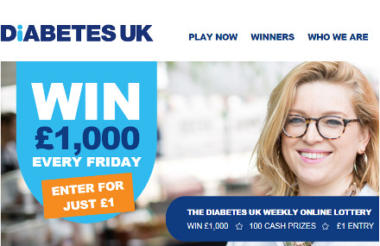Diabetes UK says that it expects income from its weekly lottery to reach £2.5m in 2020, by which time it will exceed income from both regular giving and membership.
Speaking at Fundraising Magazine's Fundraising First Thing breakfast seminar on society lotteries earlier this week, supporter acquisition manager at Diabetes UK Pauline McCulloch said that in 2014 the weekly lottery raised £1.5m.
In 2015, it raised £1.8m and is on course to raise about the same this year. By 2020 lottery income is forecast to hit £2.5m.
"I cannot stress to you enough, how much of a strong product the weekly lottery is for Diabetes UK," she said. "Diabetes as a condition is well known, but not so much as a cause requiring financial support and we don't have a sponsorship product. In a 2013 root and branch analysis, the lottery was identified as a strong product and we have grown it since then."
In 2011, Diabetes UK had roughly 12,000 players made up of charity members and raffle players; by 2016 it stands at around 20,000.
Supporters pay £1 per entry and in 2008 the charity had 11,000 entries per week; by October 2016 it was more in the region of 33,000. Number of entries for each week lottery from a single participant is capped at 20, and players must be over 16.
TV campaign and online portal
According to McCulloch, the continued success of the lottery is down to a successful daytime TV campaign and the creation last year of an online portal for entry.
"To complement face-to-face we needed another high-volume driver for acquisition," she says. "A value-exchange DRTV campaign, which we ran previously, had over 40,000 responses. That gave us hope that it would also work for the lottery."
The charity expected to receive 360 entries from its first burst of TV advertising in May this year, but actually received 847, registering an return on investment of 0.91 (excluding creative).
"It really has surpassed what we thought we could achieve with it," she says.
The campaign was so successful that the charity ran another one in July and a further burst in October, with each burst costing between £40,000 and £60,000. Diabetes UK is now planning late-night campaigns in December to diversify the donor-base, aiming at younger online players.









